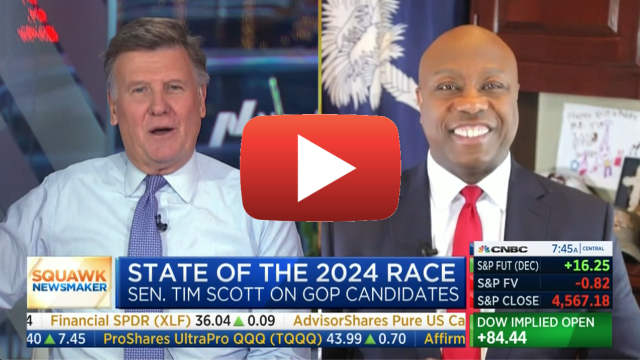- Wednesday, December 6th, 2023
Scott Joins Squawk Box to Discuss CEO Hearing, Regulatory Impact on the American Dream
‘So why would we go down a road of, what I consider, a nightmare of regulatory burdens that will restrict capital in the marketplace which means fewer loans for small businesses, fewer homes for first-time buyers and a strong challenge – headwinds – against the American Dream?’
WASHINGTON — Ranking Member Tim Scott (R-S.C.) joined CNBC’s Squawk Box this morning ahead of the Senate Committee on Banking, Housing, and Urban Affairs hearing with the leaders of the nation’s largest banks. In the interview, Ranking Member Scott pushed back on the Biden administration’s regulatory agenda, including the Basel III Endgame proposal, for the harm it would cause to consumers and the American Dream – particularly for those living paycheck to paycheck. Ranking Member Scott highlighted that more capital on the sidelines as the result of increased regulatory burdens would lead to fewer jobs, less wage growth, and would crush small businesses.
Click here to watch the full interview.
On the importance of protecting the American Dream…“You know the real question we should ask ourselves is, how do we make sure the American Dream is alive and well and healthy for the average person who today might be growing up in poverty or working paycheck to paycheck. The question is, you think about Basel III, the Endgame. How is a higher capital standard going to make our economy healthy or safer? The answer is – it does neither. Therefore, having more regulations will not actually make our economy healthier and it will not make our banks safer. So why would we go down a road of, what I consider, a nightmare of regulatory burdens that will restrict capital in the marketplace which means fewer loans for small businesses, fewer homes for first-time buyers and a strong challenge – headwinds – against the American Dream?”
On the impact of new regulations on the American people in Biden’s economy…“We have higher inflation, which led to higher interest rates, which means we have a slowing down of the economy. 2024, I think will be much slower than 2023. As a result of that, adding new regulatory burdens puts more capital on the sidelines. Means that fewer Americans will [have] access to better jobs, higher income and, frankly, more businesses. All of that will reverse upon the American people, reverse the fortune of a strong economy brought to us through 2017 through 2020, allowed us to weather the pandemic, because we had a strong economic footing. This next year we’ll see a reversal of some of that fortune that we’ve been able to benefit from the last couple years. If we have more burdensome regulations, we’ll have fewer economic outcomes that lead us in the right direction.”
On the unforeseen impacts of one-size-fits-all regulatory requirements…“Every time you increase the regulatory burden beyond what it is today, you actually insulate these banks to making more bad decisions, not better decisions. Because we have made, not we but the Left, have made these G-SIBS too big to fail. They’re looking at creating utilities in the banking sector. That’s not good for the American economy, and it certainly is not good for the American consumers.”
BACKGROUND
Last month, Ranking Member Scott led 38 of his colleagues – including every Republican member of the Senate Banking Committee – in urging the Federal Reserve (Fed), Federal Deposit Insurance Corporation (FDIC), and Office of the Comptroller of the Currency (OCC) to withdraw the Basel III Endgame proposal.
